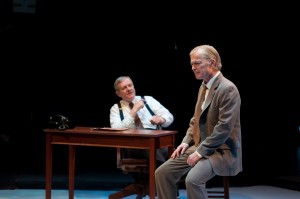
Dafydd ap Rees (Mick Ross) and Allyn Burrows (Alan Turing) in Hugh Whitemore's BREAKING THE CODE through May 8. Presented by Catalyst Collaborative@MIT. Performances at Central Square Theater at 450 Massachusetts Avenue, Cambridge. Tickets and Information: http://CentralSquareTheater.org or 866-811-4111. Photo by A.R. Sinclair Photography.
Breaking the Code by Hugh Whitemore, Underground Railway Theater and Catalyst Collaborative @ MIT, Central Square Theater, 4/7/11-5/8/11. http://www.centralsquaretheater.org/season/10-11/code.html.
Reviewed by Becca Kidwell
Intelligence is a prized commodity that governments and businesses appropriate for their own needs, but don’t always appreciate the ones who provide it. Alan Turing was loved by Great Britain for his decoding work during World War II and was derided for his failure to conform to social norms after the war. Breaking the Code masterfully explores the isolating nature of “polite” society.
Underground Railroad Company and Catalyst Collaborative@MIT bring the audience into the world of Alan Turing’s mind and memory. Performed in the round, the audience literally steps into Janie Howland’s set of inverse geometric spirals as they take their seats. Strings across the walls and ceiling connect formulas and ideas. Following the idea of the spirals, director Adam Zahler has Turing (played by Allyn Burrows) follow these patterns as Turing moves through the various moments of his life. The set and the action become an extension of Alan Turing’s personality.
Allyn Burrows plays the awkward, yet gifted mathematician, engineer, and physicist. Burrows captures the social awkwardness and guileless innocence of Alan Turing. Burrows creates a detailed and precise character down to the stutter. Although history has been written, one cannot help but hope that somehow he will be left alone to live his life. Turing’s inability and/or unwillingness to “play the game” when he is confronted with denying his homosexuality or convicting himself leads his country to vilify and destroy Turing’s very core. Burrows shows that while Turing longs to connect with people, Turing ultimately ends up alone because no one is willing to follow him–even ideologically–to the nucleus of his person.
Danny Bryck plays three incarnations of Alan Turing’s friends and lovers. As Ron Miller, the wall is built up because of a lack of trust; with Nikos, no extra walls are needed as they do not even speak the same language. The only one who Turing truly connects with is his close friend who dies young; Turing holds onto this connection as a stronghold throughout his life. Bryck creates three distinctive personalities that each react differently to Turing’s attentions. In addition, as Nikos, Bryck speaks beautiful Greek that seems natural, and I cannot determine whether it is great acting or whether he truly speaks Greek.
Liz Hayes, as Pat Greene, displays genuine warmth and affection towards her co-worker. The gentle love radiates from her and touches the audience. Pat wants to marry Alan even though she knows he’s gay and it is evident that she would have stood by him even though he could not return her affections.
Debra Wise plays Alan’s mother Sara who tries to understand and support her son even though she really does not know how to. While they tend to clash at every turn over small matters, Wise demonstrates that Sara loved and supported her son throughout his ordeals. Mark Harpin adds to the air of mystery as Smith; Dafydd ap Rees rounds out the cast as Turing’s closeted boss during the war and the unwavering detective surrounding the “crime” of gross indecency.
Throughout the play, Alan Turing cannot accept that all things in the world can be quantified in concrete terms. He asks why he must be called either a mathematician or an engineer but not both. Hugh Whitemore’s passionate play shatters the toxic walls that confined Turing’s life; the director, cast, and set allow Turing to freely move and express himself to an audience that will listen and accept him for who he is. This beautiful production connects all of the geeks, freaks, and other people outside of the norm and reminds them that they should be who they are and stop trying to fit into other people’s conceptions of who they should be. 4/10/11.
